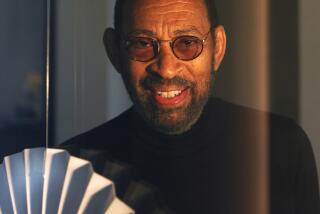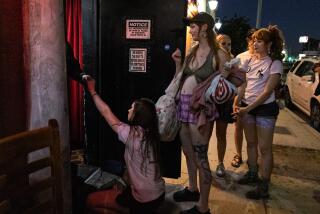Steps Still Fresh for Hoofers : Reunion: Veteran Harlem nightclub dancers cut a rug, hug, catch up in Manhattan after nearly 50 years.
- Share via
NEW YORK — Most had gray in their hair, some had a few extra inches around the middle and a few even wore orthopedic shoes.
But when the band played, the ladies danced.
In sequins and feathers, a chorus line of more than 50 veteran hoofers strutted, tapped and shimmied Sunday to “Take the A Train” in a grand reunion of chorus dancers from Harlem’s most celebrated nightclubs.
Now in their 60s, 70s and 80s, hundreds of them had traveled from as far away as Los Angeles to hug and catch up after nearly 50 years at a reunion of performers who once had backed up the likes of Fats Waller, Count Basie and Duke Ellington.
Although they worked anonymously for $20 a week at such venues as the Apollo Theatre and the Cotton Club, they say they have been virtually excluded from the history of a golden era in American music.
“In most people’s minds these women have become extinct. It’s like they never existed,” said Geraldine Rhodes Kennedy, a 60-year-old Harlem bartender who organized Sunday’s charity reunion, which drew about 500 to a Manhattan hotel ballroom.
Kennedy said she came up with the idea of a reunion a decade ago when regulars who sat at her bar became misty-eyed when they retold the colorful tales of Harlem’s musical past.
“In this country the whole selling point of everything is youth. I just wanted to say there’s nothing wrong with getting old,” Kennedy said.
Veterans such as Ruby Riley, 73, have been touring the nation with a troupe called The Silver Belles and teaching senior citizens to tap-dance. At last count there were 50 enrolled in Riley’s class.
“I’m just so thankful to God that at 73 years old I can still kick my feet up,” she said, decked in a silver tuxedo after her performance Sunday.
Bertye Lou Wood, 85, another member of The Silver Belles, made her debut at age 22 in 1927, dancing in the chorus of the Lafayette and Apollo theaters, where “we worked like dogs and got no money.”
Pauline West Jones, 69, a chorus dancer from 1939 to 1946, remembered scraping by for $18 a week, her salary for three shows a night.
Jones had wanted to be a ballet dancer, but race was a barrier. “If you were black, no way,” she said.
Actor and tap-dancer Gregory Hines, who came to see the veterans, said he is pleased they are getting recognition.
“I’ve stolen a lot of steps from them in my time,” Hines said.
More to Read
Sign up for Essential California
The most important California stories and recommendations in your inbox every morning.
You may occasionally receive promotional content from the Los Angeles Times.













